News & Events
Meet Andrea Walters – multimedia artist extraordinaire
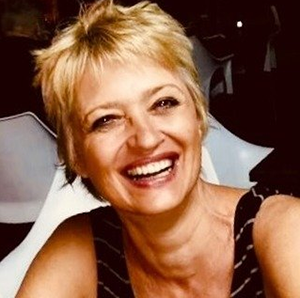
Andrea Walters
Andrea Walters was born in Queenstown (now Komani) in the Eastern Cape. Her parents divorced when she was five years old. She went to school in Windhoek, Namibia, Bloemfontein, and Durban, where she matriculated.
Andrea’s father was her role model. He was a master craftsman who encouraged classical music, ballet, and art. He also taught her how to ride a motorbike and to make wooden toys. She said she went through a horrible divorce and her best friend, who was studying psychology through Unisa at the time, encouraged her to “study something”.
She did a lot of freelance work: writing, make-up artistry, and event organisation, so it was much easier for her to manage her studies than for students who work full-time. As a child, she was enthralled by the beauty of nature, so it was inevitable that she would try to draw what she saw and that is when her interest in art started.
Andrea said what she liked most about studying through Unisa, was her lecturers. They are without a doubt the most committed, enthusiastic, and supportive lecturers she could ever have wished for. They include well-known artists and theoretical experts in a variety of fields. Even Professor Pooley, the Head of Art and Music, has an open-door policy towards students and is incredibly helpful.
During her time as a student, she made friends and developed her skills. She received her Bachelor of Visual Arts in 2016 and she is busy completing her Master of Visual Art this year. Andrea said the best advice she can give students, is that they should not rush through their studies. This is not a race. She said it was important to work consistently and if you need help, to ask for it. This is not only an investment in your future but in you, the person. Her future dreams are to enrol for a Ph.D. through Unisa focusing on an art project with women jailed for killing their abusers.
Andrea will be presenting a multimedia exhibition at the Durban Art Gallery from 3 to 24 March 2022. Her exhibition entitled #OverMyDeadBody honours the women murdered by their partners. Walters combines women’s objects with audio-visual work, an embroidered death shroud and Sunlight soap sculptures of the mouths of the silenced women. She said, “In South Africa, there is a cross-cultural perception that it is acceptable for a man to punish a woman through violence or even death”. Walters will conduct interactive walkabouts with school learners during this exhibition.
Andrea shared her artist statement for this exhibition with me:
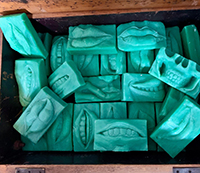
Pandora's Box by Andrea Walters |
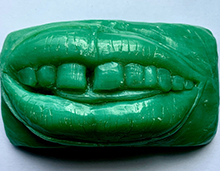
Vicky Ntozini by Andrea Walters |
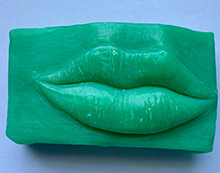
Reeva Steenkamp by Andrea Walters |
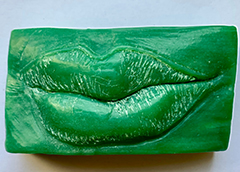
Tshegofatso Pule by Andrea Walters |
“My strategies that honour femicide victims are influenced by my experience of IPV since memories are activated by domestic objects. The #OverMyDeadBody exhibition attempts to counter the ongoing perception that it is acceptable for a man to punish a woman through violence or death. I believe that when women survivors see artwork on IPV, it provokes an instinctive response: they remember, because they cannot forget.
My creative process began by gathering data and images of SA femicide victims through the media. I sought materials that would best represent women across socioeconomic boundaries since femicide affects all cultural and racial groups. I decided to sculpt their mouths on Sunlight soap bars found in most households and used in some cultures to prepare bodies for burial. My mother’s passing inspired a death shroud embroidered with the victims’ names. Practical experimentation led to other works in this exhibition. I hope to engage the viewer in a participatory role by supplying additional soaps and carving tools. I hope that “something” happens between the viewer and the artwork, evoking individual emotional responses such as grief, empathy, or pain.
The #OverMyDeadBody exhibition comprises 50 Sunlight soap sculptures resting on transparent shelves and a suspended death shroud. It includes an audiovisual performance and domestic items that refer to intimacy, sexuality, and violence. “
* By Jo Cossavella, Communications Officer, Unisa KwaZulu-Natal Region
Publish date: 2022/02/17
